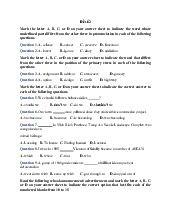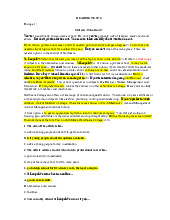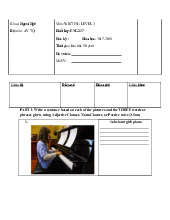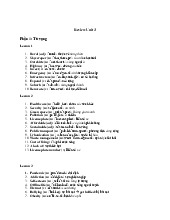




Preview text:
READING TEST 9
Passage 1: (B1) https://englishpracticetest.net/whale-watching-trip-b1-english-reading-test/ Whale-watching trip by Jack Madison, 15
A while ago, my friend Olivia was telling me about a whale-watching trip she’d been on, in Canada. I
wanted to tell her I was about to do the same thing, off the north coast of the UK, where my
grandparents live. Whales had recently appeared there again, and my grandparents were convinced
we’d see some – so I was sure my trip would be as good as Olivia’s! But then I saw some review of the
trip my dad had booked for us, when no-one had seen any whales at all. So, in the end, I decided not to
tell Olivia anything about my trip, in case it wasn’t successful!
Anyway, Dad and I set off on our trip – which was Dad’s idea – and it was fantastic! Travelling out to sea
on the tour boat with our guide, we soon reached the spot where whales often appeared. Then we
waited – and nothing happened. I was sure this wouldn’t last, though. People kept calling out they’d
seen one, which was exciting – but then it turned out they were wrong. Then finally I saw something
move under the water – a minke whale! So I felt like a hero for the rest of the trip!
The whale was a wonderful sight, with its huge back not far from the boat. Our guide said it was around
five tonnes in weight and around 10 metres long. Yet, despite its size, it swam alongside us at speed, and
with little effort. We waited to see if more appeared, and some time later, we saw three more some
distance away, that kept diving under the water and coming up again. Then just after I’d filmed them, they disappeared.
Although the water’s less deep around the coast, larger whale species appear in the area with minke
whales, feeding on fish. But minkes are curious creatures, so they’re more likely to approach tourist
boats – which was why we were successful! Then later, up on the cliffs, we looked out to sea, searching
for signs of whales. Sometimes seabirds diving into the water means whales are around, as they’re
stealing the whales’ meal. We were unlucky, sadly – but we’ll be back!
1 Jack wasn’t keen to mention his whale-watching trip to Olivia because
A he thought her trip sounded a lot more exciting.
B he’d read some negative reports about where he was going.
C he wasn’t sure if his dad had definitely arranged it.
D he didn’t know whether she was very interested in whales.
2 On board the whale-watching boat, Jack
A was proud to be the first person to see a whale.
B began to worry that they might all be disappointed.
C tried not to get excited when anyone saw something.
D was glad he’d persuaded his dad to come with him.
3 When Jack saw the minke whale, he was
A surprised at how close it came to the boat.
B amazed that it was so much bigger than he’d imagined.
C impressed that it moved through the water so easily.
D delighted to see it had arrived with several others.
4 Jack suggests minke whales appeared in the same area as the boat because
A they knew there were plenty of fish there.
B they were attracted by the arrival of the visitors.
C they didn’t have to compete for food with seabirds.
D they preferred how deep the water was there.
5 What would Jack text to his grandparents about the whales?
A I’ll send you my video of the group of whales – they only appeared briefly, so they weren’t as
interesting as the first one we saw.
B Dad said he’d really wanted to go to Canada to watch whales, like my friend Olivia – but now
we’re really happy we came here.
C I must take you up to the cliffs to look for whales – we’ve seen them every time we’ve been there, so far.
D You were so sure our whale-watching trip would be a success, while I still had doubts – but you were right.
Passage 2: B2 https://englishpracticetest.net/cycling-home-from-siberia-b2-english-reading-test/
Cycling Home from Siberia, by Robert Lilwall
We had been flying east all night and I awoke to notice that it was already daylight. Looking out of the
window onto the empty landscape below, the dark shades of brown and green reassured me that,
although it was mid-September, it had not yet started snowing in Siberia. I could see no sign of human
life and the view rolled away in an otherworldly blend of mountains, streams and forests to an endless horizon.
My Russian neighbour Sergei woke up and smiled at me sleepily. I had told him that I was flying to the
far-eastern Siberian city of Magadan with only a one-way ticket because it was my intention to return
home to England by bicycle. ‘But, Robert,’ he had reasoned with me, ‘there is no road from Magadan;
you cannot ride a bicycle.’ I explained that I had reason to believe that there was a road, though not
many people used it these days.
‘Alone?’ he asked, pointing at me.
‘No, I will be riding with a friend called Al.’ ‘Just one friend?’
‘Yes just one,’ I nodded. Sergei still looked unconvinced and with just one word ‘Holodna’ (cold) he
pointed outside. I tried to bolster my case by explaining to Sergei with (line 27) hand gestures that I had
a lot of warm clothes, though I left out the fact that, because my trip was self-funded I was on a tight
budget. Most of my clothes and equipment had been bought at slashed prices. In reality, I was not at all
sure they would be up to the job. This was especially true of my enormous postman’s over-trousers which I had bought for £10.
My life of travel had all started in a lecture hall in Scotland several years ago. The hall that morning was
full of students slumped in their seats. Some were taking notes, without energy. The lecturer droned on.
I was thinking hard about a particular dilemma. Should I ask him or not? ‘Well, why not?’ I tore a fresh
sheet from my pad and wrote, ‘Hi Al, Do you want to cycle across the Karakorum Highway between
Pakistan and China this summer? Rob.’ In the row in front of me slouched Al, my old school friend. I
tapped him on the shoulder and passed the note. He tried to decipher my scrawl, scratched his head,
wrote something and passed it back. I unfolded it and held my breath while I read. ‘OK,’ it said.
Six years later I was going to join Al in Siberia. I had been working as a geography teacher and although I
was still far from having full control of my classes, the job did tick many important boxes for me. It was
frequently challenging, rarely boring, often fulfilling and of course there were great long holidays in
which to chase adventures. Twice since I had started teaching I had used these holidays to go to meet Al.
He had caught the adventuring bug in a big way after our bike ride through Pakistan and so had decided
to do something far more relaxing than teaching: to cycle around the world. I was now joining him for
the Siberian part of his trip.
Ever since that first ride we had taken together, Al had been setting himself greater and greater
challenges. This round-the-world by-bike trip was certainly his greatest so far. At times he thought that
the ride, or the road, would break him. Although it sounded tough, I envied him in many ways. He was
having an extraordinary adventure, finding that he could deal with each new challenge even if it seemed
impossible. He was proving wrong the sceptics who had told him he could not do it. He was doing
something that scared him nearly every day and it made him feel alive.
6 In the opening paragraph Robert reveals that he was
A grateful that the long night was over.
B relieved that the winter weather had not yet arrived.
C surprised that the area seemed uninhabited.
D disappointed by the colours of the earth below him.
7 Robert uses the phrase ‘bolster my case’ in line 27 to show that he was trying to A change the subject.
B end the conversation. C reassure Sergei. D correct Sergei.
8 Robert uses the example of the over-trousers to show that
A he had been successful in getting local people to help him.
B he had had a restricted amount of money to spend on clothes.
C he was confident that he was well prepared for the extreme cold.
D he had been able to negotiate good prices for his equipment.
9 What do we learn about Robert in the lecture hall?
A He didn’t want the lecturer to notice his lack of attention.
B He was puzzled by something the lecturer had said.
C He was unsure about what to write in the note.
D He was apprehensive about his friend’s reaction to his suggestion.
10 How can Robert’s attitude to teaching best be summarised?
A He felt it was the right career choice for him.
B The holidays were the only positive aspect of the job.
C He felt the job was getting too stressful.
D He enjoyed having the respect of his students.
11 What does Robert say about Al’s round-the-world trip?
A Al never doubted that he would be successful.
B Al tried to hide the difficulties he was facing from his friends.
C Al was pushing himself to the limit of his capabilities.
D Al was totally fearless as he enjoyed the adventure.
Passage 3: B2 https://jaimemiller.com/delta-key-to-toefl-ibt/reading-quiz-3/?fbclid=IwAR2yVUk-
zm_u-sEAg1tl8hmxc6Ov90HFNWDPJ8waVMyKXGGbIptixP5CAwo#undefined
THE ORIGIN OF THE UNIVERSE
1. Astronomers believe that the universe began with a large, dense mass of gas consisting mainly of
hydrogen, the simplest of all the naturally occurring chemical elements. The mass of hydrogen was very
hot and caused intense light and much expanding motion. As the universe expanded, its light became
dimmer, yet even now some of the primeval light may be present.
2. The original universe underwent a physical transition that gradually differentiated it into galaxies,
stars, and planets. As the original mass of gas expanded and cooled, large clouds separated themselves
from the parent mass. Gravity played an important role in this mechanism. Matter is subject to gravity,
yet matter is also the cause of gravity since it is matter’s mass that determines the strength of the gravitational force.
3. Scientists believe that the original mass of gas in the universe was not completely uniform, and there
were some regions that were slightly denser and capable of generating stronger gravitational fields than
others. Since gravity tends to pull matter together, the denser regions tended to become even more
compact. Thus, small variations in the original mass evolved into denser clouds that gradually separated
from the expanding parent mass. From these clouds, the galaxies were formed.
4. At the end of the first phase of the universe, a great number of huge clouds had become separate
entities that could start their own independent evolution. These turbulent clouds— ancient galaxies—
contained variations that grew in importance over time. The clouds divided into smaller and smaller
“cloudlets” that gravity caused to contract. The increase in pressure from this contraction caused the
temperature to rise until the cloudlets began to glow as individual, luminous stars.
5. Astronomers believe that the earliest galaxies were small when they formed most of their stars, but
accumulated most of their mass later through collisions. Large galaxies formed in stages as smaller
galaxies were attracted to one another by gravity. As the smaller galaxies were pulled together over
time, they merged into larger and larger structures, eventually forming massive galaxies. As many as half
of all galaxies are thought to have been involved in some sort of collision.
12. The word primeval in paragraph 1 is closest in meaning to A. original B. important C. expanding D. beautiful
13. The word transition in paragraph 2 is closest in meaning to A. transaction B. struggle C. combination D. change
14. The word uniform in paragraph 3 is closest in meaning to A. suitable B. unusual C. consistent D. filled
15. The word compact in paragraph 3 is closest in meaning to A. distinct B. dense C. disconnected D. distant
16. The word luminous in paragraph 4 is closest in meaning to A. light–emitting B. densely packed C. high–pressure D. very beautiful
17. The word merged in paragraph 5 is closest in meaning to A. bent B. froze C. blended D. eroded



